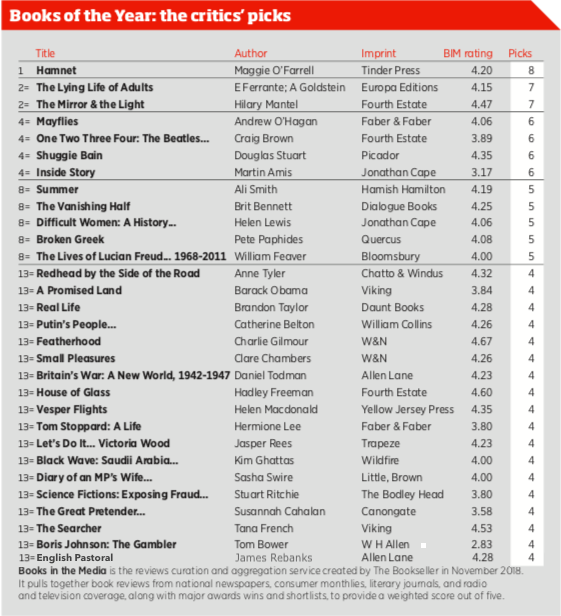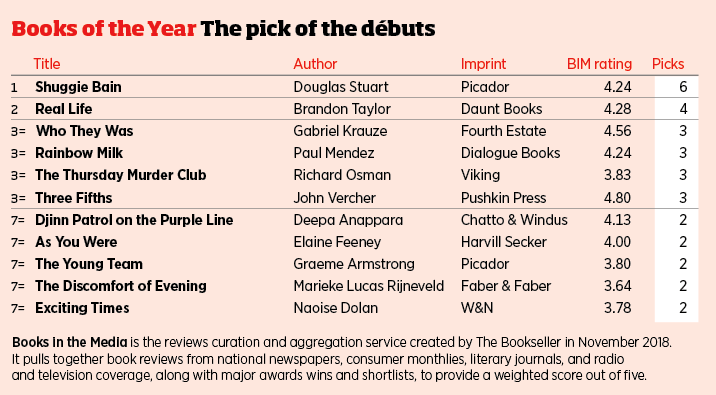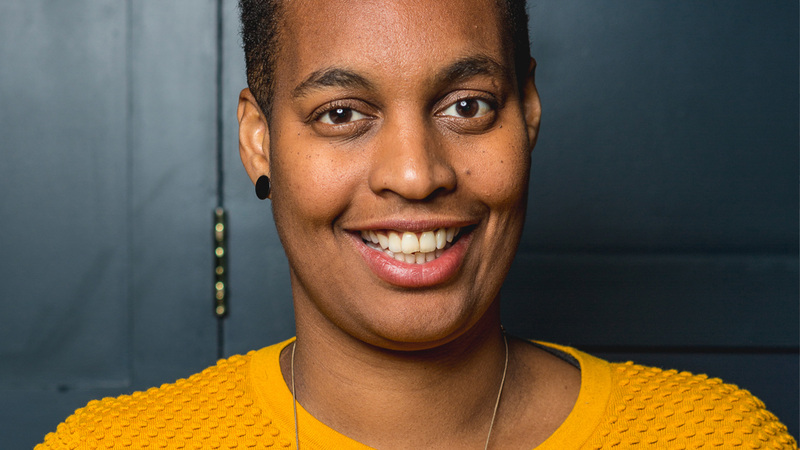You are viewing your 1 free article this month. Login to read more articles.
O’Farrell is the critics’ pick of 2020 as Hamnet, Mantel and Ferrante top the pile
Eight publications included Hamnet by Maggie O’Farrell pictured above in their end-of-year “book of the year” round-ups, making the title the critics’ top choice of the year. Collated through The Bookseller’s reviews curation and aggregation service Books in the Media, 10 publications (the Sunday Times, the Times, the Guardian, the Observer, the Daily Mail, the Telegraph, the Financial Times, the Evening Standard, the New York Times and the Spectator) made 1,068 recommendations, with 834 individual titles mentioned in the round-ups.
This caps off a huge year of wins for O’Farrell’s eighth novel. Published almost exactly 20 years to the day since her début After You’d Gone (Headline Review), Hamnet was a true celebration of the author’s career, as it picked up the Women’s Prize for Fiction and was crowned the public’s favourite book of the year at the Books Are My Bag Readers Awards. Last week, it was also named Waterstones Book of the Year.
The chain retailer said the novel offered “an especially prescient message for this turbulent year” and critics have been just as unreserved in their praise for Hamnet, which currently has a 4.2 weighted average score (out of 5) on Books in the Media across 17 reviews in the press. The Observer’s Stephanie Merritt called the historical novel “a work of profound understanding”, while the Scotsman’s Stuart Kelly wrote: “This is a staggeringly beautiful and unbearably poignant novel. O’Farrell is one of the most surprisingly quiet radicals in fiction.”
 Elena Ferrante’s The Lying Life of Adults and Hilary Mantel’s The Mirror and the Light tied for second place, drumming up seven mentions apiece in this year’s lists. The final instalment in Mantel’s Booker Prize-winning Wolf Hall trilogy is the most-reviewed book on Books in the Media, with a whopping 22 reviews, and an average weighted score of 4.47. Critics clearly appreciated the 900-page narrative; the New Statesman’s Rowan Williams called the novel “a worthy conclusion to what is undoubtedly one of the great historical fictions of the age”.
Elena Ferrante’s The Lying Life of Adults and Hilary Mantel’s The Mirror and the Light tied for second place, drumming up seven mentions apiece in this year’s lists. The final instalment in Mantel’s Booker Prize-winning Wolf Hall trilogy is the most-reviewed book on Books in the Media, with a whopping 22 reviews, and an average weighted score of 4.47. Critics clearly appreciated the 900-page narrative; the New Statesman’s Rowan Williams called the novel “a worthy conclusion to what is undoubtedly one of the great historical fictions of the age”.
Ferrante’s The Lying Life of Adults, translated by Ann Goldstein, is a worthy competitor for second place, heralded “ferocious” by the Sunday Telegraph, “mesmeric” by the Spectator and “astonishing” by the Guardian. Critics across the board agreed that Ferrante’s return after a five-year absence was a worthy one. “What a relief it is when an author who has written a masterpiece returns to prove the gift [is] intact,” said Dayna Tortorici of the New York Times.
Douglas Stuart’s Booker Prize-winning début Shuggie Bain reigned supreme in the Times, as it was named the newspaper’s Novel of the Year. “It does what all good fiction should and makes you walk in the scuffed trainers of people who live very different lives,” said the publication. The semi-autobiographical novel picked up five further commendations from critics.
Normal people
In non-fiction, reviewers favoured memoir and biography, with nine titles in this category picking up four or more mentions for “book of the year”. Craig Brown discovered that all you need is love from the critics to make it to the top, as his biography One Two Three Four: The Beatles in Time garnered six mentions to claim joint-fourth in the most reviewed list.
Broken Greek, the coming-of-age story from music journalist Pete Paphides, and The Lives of Lucian Freud: Fame 1968-2011, the second volume of William Feaver’s biography of the notoriously private artist, came in just under Brown’s title, with five nods apiece.
Barack Obama’s memoir A Promised Land, which was elected to the top of the Official UK Top 50 in its first week, picked up four votes. After a four-year wait, Obama’s memoir is a clear favourite with critics and readers alike. The title quickly racked up 12 reviews on Books in the Media, and though Nielsen BookScan was unable to provide volume or value data while English bookshops were shuttered under lockdown, Penguin Random House reported that the memoir sold more than 100,000 across all editions in the UK and Ireland in its first full week on sale, on top of the 147,000 units it sold in its first partial week.
A Promised Land wasn’t the only inside look into politics that caught the attention of critics this year; Sasha Swire’s Diary of an MP’s Wife: Inside and Outside Power picked up four mentions for “book of the year”, and a healthy average weighted score of four out of five on Books in the Media.
Prime material
Boris Johnson also made an appearance, not as an author, but as the subject of Tom Bower’s biography Boris Johnson: The Gambler. Despite mixed reviews on publication (it currently has a score of 2.83 out of five on Books in the Media), the title also made its way onto four “book of the year” lists.
The Prime Minister wasn’t the only member of his famous family to hit this year’s list either. Stanley Johnson’s 1982 pandemic thriller, The Virus, made an appearance in the Evening Standard after it was opportunistically republished in June by Black Spring, an imprint of independent publisher Eyewear Press.
Unsurprisingly in a year when life was consumed by just one subject, The Virus wasn’t the only pandemic-related title to appear in the end-of-year round-ups. Adam Kucharski’s The Rules of Contagion (Wellcome Collection) was the most recognised in the genre as it was picked up by the Times, the Guardian and the Financial Times.
Mark Honigsbaum’s The Pandemic Century: A History of Global Contagion from the Spanish Flu to Covid-19 (W H Allen) Debora MacKenzie’s Covid-19: The Pandemic that Never Should Have Happened, and How to Stop the Next One (Little, Brown) and Meera Senthilingam’s Outbreaks and Epidemics (Icon Books) picked up one mention apiece.
There were no children’s books among the top titles, and just five were selected more than once as a book of the year, but this year’s champion O’Farrell did pick up an extra acknowledgement in the Times and Sunday Times for her first children’s book Where Snow Angels Go, illustrated by Daniela Jaglenka Terrazzini (Walker Books).
J K Rowling’s The Ickabog (Little, Brown), Sally Nicholls’ The Silent Stars Go By (Andersen Press) and Meg Rosoff’s The Great Godden (Bloomsbury YA) were among the highest achievers in children’s, with two mentions each.
According to the weighted average scores on Books in the Media, The Great Godden was the critics’ favourite of these titles, with an average weighted score of 4.25 out of five. The Times’ Alex O’Connell earmarked the title as a Children’s Book of the Week in June, proclaiming the book was “far too good to be monopolised by the teenage market”, while Francesca Carington gave the book five stars in the Telegraph, and praised Rosoff as “a rare writer of young adult fiction who is also loved by grown-ups”.
To see more of the newspapers’ books of the year coverage, as well as the reviews aggregated to date, visit booksinthemedia.thebookseller.com/.
First novels
Stuart and Taylor lead first-time successes
 As the Observer’s Alex Preston put it, “2020 has been a year of superb débuts” and they certainly stood their ground among the critics’ picks for book of the year, with six débuts picking up three or more mentions.
As the Observer’s Alex Preston put it, “2020 has been a year of superb débuts” and they certainly stood their ground among the critics’ picks for book of the year, with six débuts picking up three or more mentions.
Critics seemed to favour Booker-commended débuts in their lists, with the highest ranking among them Douglas Stuart’s winning title Shuggie Bain, which garnered six nods as well as a mention as the Times’ Book of the Year. Brandon Taylor’s Booker-shortlisted Real Life comes in with four mentions, and Gabriel Krauze’s semi-autobiographical Booker-longlisted novel Who They Was finished with three nods.
The Irish Times’ Barry Pierce raved about Taylor’s début, proclaiming that it was “unquestionably the queer novel of the year”, while fellow author Paul Mendez wrote in the London Review of Books: “Taylor has written an economical, patient and incisive examination of race relations in present-day America.”
Mendez picked up three commendations for his own début Rainbow Milk, which was called “groundbreaking” by the Guardian and “eye-poppingly frank, urgent and fresh” by the Independent.
Richard Osman’s The Thursday Murder Club wasn’t pointless to critics either, as it also picked up three “book of the year” nods. In the Times, Mark Sanderson wrote: “The way he evokes the passing of time adds greater depth, and emotional power, to what is essentially a contemporary Ealing comedy.” In September, The Bookseller reported that the title became the fastest-selling début crime novel since Nielsen BookScan records began, and Osman has already signed on for a further two titles in the series.
John Vercher’s Three Fifths was the top-rated début, according to the average weighted scores on Books in the Media, finishing with 4.8 out of five. Dubbed a “deft exploration of the great racial divide” by the Irish Times’ Sarah Gilmartin, the novel picked up a total of three accolades on the books of the year lists.














